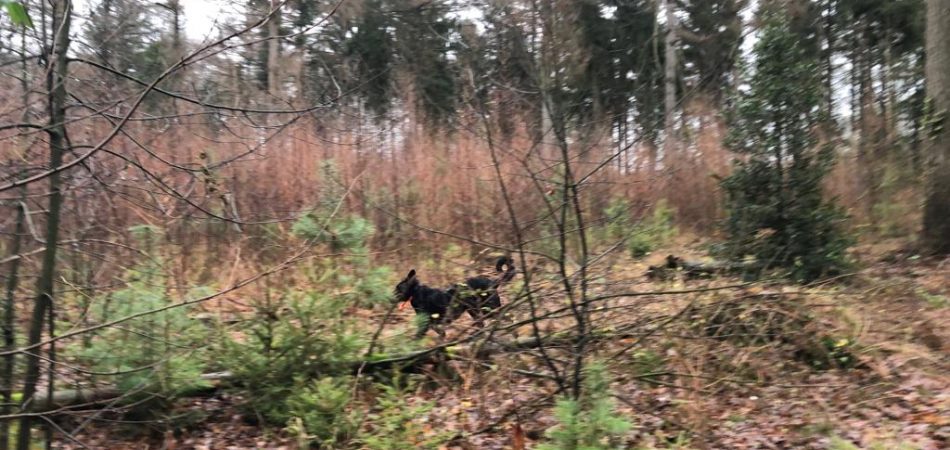By rubble we mean all locations that resemble areas hit by earthquake, tsunami or explosions. Here too the dog will work independently, although much closer to the handler than in rural areas. Both the dog and the handler must be able to manoeuvre over difficult terrain. During training, great care is taken of the dog, and it is expected that the handlers have acquired a certain knowledge of building construction and the possible dangers involved. On rubble there are many more potential dangers and obstacles than in rural areas. Drains, holes and pits of varying depths, wet surfaces, slanting panels, glass, nails, wires, etc.
Experience has taught us that accidents seldom happen. A cut in the paw or a small injury does occasionally happen. However, we remain extremely vigilant and always have the necessary first-aid equipment on hand.
The bringsel is never used on rubble. It is vital that the dog moves around “naked” to avoid getting caught up by a collar. The indication will therefore be in the form of barking, digging or natural. A combination of methods is also possible. During training we strive for a uniform method, but as we have already said, the natural aptitude of the dog is the most important factor.
It is always a welcome gift for us when demolition companies make their sites available to us so that we can train our dogs on them. We are always looking for councils, companies, organisations etc. who will allow us to use their sites. We train a few times a week and one whole day in the weekend. During the weekend we can act as sort of security guards on these sites. We do of course take special care of these locations and the trust that has been put in us, and it goes without saying that we keep them clean and tidy up after ourselves.
By rural we mean searching in forests, fields, open country, moors, mountains and hills. The dog works free and off the lead, while a sort of invisible connection is maintained between the dog and his handler. The dog works independently across an area while the handler keeps a careful check on which area needs to be searched and which places require extra attention.
During training the handlers also learn to work with a GPS. This enables us to see how we need to navigate, where we are, where we have been and where we have to go. By examining the tracks we have followed we can also decide which sections of a specific area still need to be searched. In practice it’s quite a job to keep an eye on your dog and the GPS at the same time!
As soon as the dog has found someone, they will make it clear by indicating in one of the ways mentioned above. In addition to this indication, the handler will also carefully observe the dog’s body language. A dog will show through body language what he is up to. It is therefore of the utmost importance that every handler has studied the body language of dogs in general and its meaning, and most particularly that of his own dog.
We search with dogs in all kinds of environments, ranging from rural areas to rubble sites, on water and in the snow. And within almost all search disciplines a distinction is made between searching for the living or the deceased.
Oger SAR Dogs is by the Dutch taxes service knowledged as ‘Algemeen Nut Beogende Instelling’, ANBI. By these ANBI-state donaters can claim their gifts by the taxe serverice. And for Oger SAR Dogs it meand that they don’t have to pay taxis when they receive money, so you know everything is receives Oger SAR Dogs. 
Seven days a week we are accessible by our alarmnumber:
+31 (0) 622 689 140
Oger SARdogs offers families, friends and relatives the opportunity to be reunited with their loved ones in the most difficult circumstances.
In order to be able to achieve this, Oger SARdogs trains dogs and their handlers to search for missing people, both living and deceased, in all kinds of situations.
The name of the foundation is derived from the Malinois Oger, who passionately participated in many searches until old age.
Oger possessed perseverance, flexibility, social skills, work drive, work ethic, preydrive, team spirit, good physical condition, focus and stamina. Any dog can use these qualities and the dog handler would also do well to internalize these qualities if they do not already have them.












